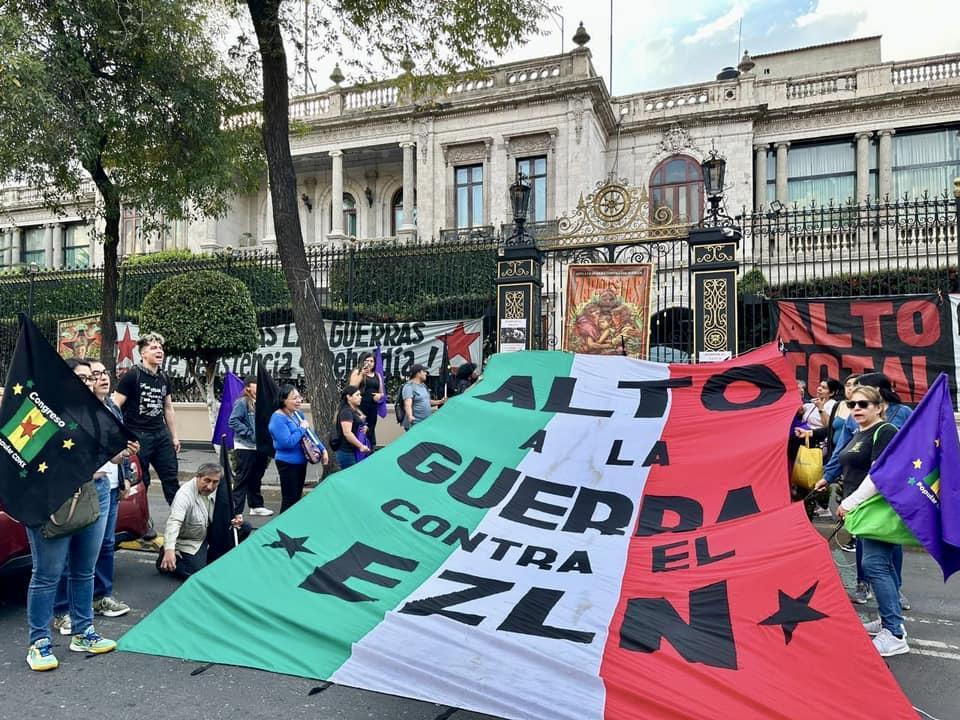
The murder in San Cristóbal de las Casas, Chiapas, of the committed Tzotzil priest Marcelo Pérez Pérez, on the morning of October 20, in a state convulsed by permanent criminal and paramilitary intimidation, and by a continued strategy of irregular warfare against the EZLN communities and their support bases, calls into question the denialist narrative of the new government regarding the reality in which millions of Mexicans live throughout the country.
The exponential violence is felt in states such as Sinaloa, Guanajuato, Michoacán, Guerrero, Tamaulipas, Veracruz, Oaxaca, among others, where cartels threaten the economic survival, daily life, tranquility and security of families, with rates of more than 100 intentional homicides per day, control of extensive regions in rural and urban areas, roadblocks, “pay to play” dues and other multiple extortions, which, as in the case of Morelos, recently claimed the lives of two retired professors from the UAEM.
The context of this tragic situation is none other than the avowed continuity (second floor) of the Fourth Transformation, with the expansion of its mega projects and individualized clientelist programs. These programs, in many regions operate as counterinsurgency, or as the “conflict engineering” of the recolonization of the territories. All the while there is the process of a visible militarization of the country, which there is no sign of abating, and the permanent presence and activity of organized crime, the other armed actor of capitalism that is depopulating and dispossessing, and fragmenting the community fabric, wearing down the resistance, and dismantling the movements, recruiting youth everywhere and kidnapping their future.
In addition, in recent months there has been an emergency situation in territories under Zapatista control, marked by the deepening of the counterinsurgency war, through the action of various armed actors. On the one hand, paramilitary groups are multiplying their attacks against Zapatista communities, and on the other hand, there is a growing presence of organized crime cartels throughout the state of Chiapas, all within the framework of the aforementioned process of militarization and militarism, accentuated once again by the incoming government.
Throughout these three decades, the existence in Chiapas of paramilitary groups has been denounced, whose function is to make up the active containment force, while the military elements are deployed as the passive containment force. To this we add the criminal groups that jointly create the conditions for the expulsion and displacement of the Zapatista and non-Zapatista indigenous communities. This is only an outline of the broad spectrum war that is being experienced in Chiapas. It is emphasized for the purpose of breaking the media siege and the denialism on these issues that seems to be taking hold in the new government, and to be hidden in the agendas and itineraries of the head of the Executive Power.
The violence described above is inherent to the democracy under the protection of the current form of militarized-paramilitary-criminal accumulation, since the de facto powers that sustain it and give it content, exercise it to achieve their economic and political objectives and, consequently, make war against the peoples their raison d’être, both nationally and internationally.
However, the concrete utopia is also there, in the multiple resistances that are found in the territories lacerated by this violence, in the determination to consider the world against the current, to not allow oneself to be dragged along by routine, fatigue and the crushing machinery of the single thought that does not admit dissidence, and deviations, much less libertarian dreams.
The strategy, reiterated by the Zapatistas, is the organization from below, from a left that does not renounce the construction of new worlds. Here we find, more than 30 years after the beginning of their insurgency movement, the Zapatista Army of National Liberation, the National Indigenous Congress and the diverse environment that is articulated with this pole of resistance, in which collectives, movements, unions and political organizations participate, some of them even ascribed to Marxism and with programs and strategies in favor of socialism.
Gone are the revolutionary desires of those who sought to transform the relations of exploitation of the Mexican working class and the systems of domination based on capitalism, in order to establish socialism. Those who set out to “change the State from within,” turned out to have been altered for personal and partisan group benefit, with the advantages of giving their justifying narratives progressive tints, and, even, fourth transformationist historical purposes.
To Fernando Cortés de Brasdefer
Original text by Gilberto López y Rivas published in La Jornada on October 25th, 2024
Translation by Schools for Chiapas.